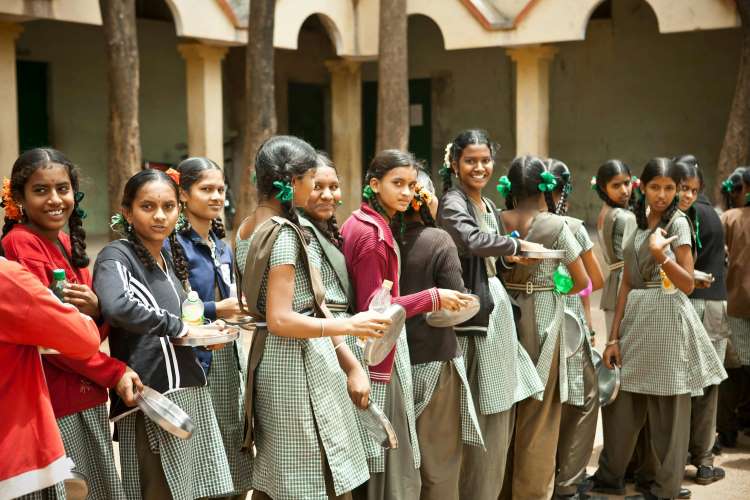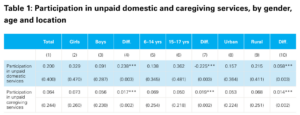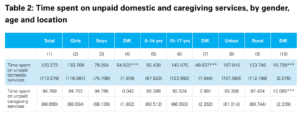
Women in many countries spend a significant share of their time performing unpaid domestic and care work. This affects their education and restricts their transition to the labour market. A 2024 UNICEF report revealed that globally, girls aged 5-14 years dedicate 550 million hours daily to household chores, while boys spend only 150 million hours. Notably, there is a negative association between girls’ participation in unpaid work and caregiving services and their engagement in learning, a disparity not as pronounced among boys.
A study conducted by Young Lives India shows that one of the key factors pulling girls out of education is their participation in domestic duties. Girls are exposed to numerous vulnerabilities from childhood, experiencing life-cycle risks that are reinforced by gendered socio-cultural norms. These barriers often deprive them of education, leading to early school dropouts. The devaluation of girls’ education, the unequal division of labour within households, and cultural expectations all contribute to this issue.
READ I ASER 2024: A paradox of progress in Indian education
Recognising unpaid work
Target 5.4 of the global Sustainable Development Goals (SDGs) emphasises the need to recognise unpaid care and domestic work as part of advancing gender equality. In India, the First National Time Use Survey (2019) by the ministry of statistics and programme implementation reported that 56% of adolescent girls (aged 14-17) participate in unpaid domestic services, with this figure rising to 60% in rural areas. On average, girls in this age group spend 2.6 hours daily on unpaid domestic work, compared with 1.4 hours for boys. A significant portion of this time is spent on food and meal preparation, where adolescent girls dedicate at least 1.9 hours. Additionally, girls spend 1.5 hours on unpaid caregiving services, further reinforcing traditional gender norms.


One of the most overlooked aspects of this burden is the role young girls play in sibling care, particularly in low-income households where parents work long hours. Since this is considered family labour, it remains largely unreported, yet it interferes with girls’ long-term learning and increases dropout rates. Studies indicate that gender disparities in education reflect deep-seated household discrimination. Furthermore, access to education and learning opportunities varies across socio-cultural contexts, geographical regions, and social groups, highlighting the need to address these intersectional challenges.
Time use surveys play a crucial role in capturing the extent of unpaid and care work performed by girls, informing policies to address these challenges. Measuring both schooling and non-schooling hours is essential for formulating gender-responsive child protection policies. The 19th International Conference on Labour Statisticians (ICLS) (2013) recommended conducting specialised surveys to analyse children’s time use patterns, which would help identify the excessive burden of unpaid work on girls.
Government initiatives
India has taken steps to address gender disparities in education and unpaid labour. The Beti Bachao Beti Padhao initiative, launched in 2015, has been a flagship programme promoting the education and empowerment of girls. Furthermore, India’s vision of Viksit Bharat 2047 prioritises girls’ education and well-being as crucial indicators of gender equality. Addressing unpaid and care work through targeted policy interventions is vital for preparing girls to transition into the labour market.
Investment in care infrastructure can significantly reduce the unpaid workload of girls. The G20 New Delhi Leaders’ Declaration (2023) under India’s presidency emphasised the need to invest in social protection and affordable care infrastructure to promote women’s participation in education and employment. Additionally, a T20 policy brief under India’s G20 presidency recommended recognising care work as a fundamental pillar of social protection and economic growth, with the provision of care services as a public good.
The Union Budget 2024-25, presented by finance minister Nirmala Sitharaman, allocated over Rs 3 lakh crore to schemes benefiting women and girls, including investments in care infrastructure. As the country prepares for the 2025 budget, there is immense scope to further expand welfare schemes for girls and address unpaid work through gender-responsive social protection measures.
To achieve meaningful gender equality, it is essential to address unpaid work through state-sponsored care facilities, family support systems, and community engagement in redistributing domestic and care responsibilities. Policies aimed at eliminating gender discrimination against girls remain critical in ensuring their right to education and overall development. Without targeted interventions, the burden of unpaid work will continue to limit opportunities for millions of girls worldwide.
Ellina Samantroy is a Fellow and Co-ordinator, Centre for Gender and Labour, at VV Giri National Labour Institute, Noida.
